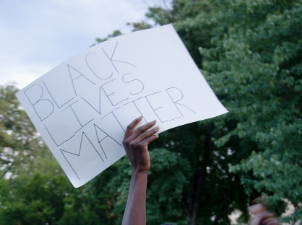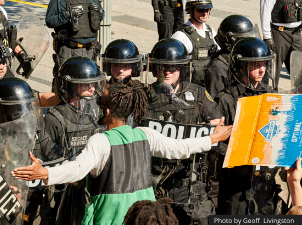
The Seventh Anniversary of Shelby: A Reminder of the Fight to Restore Voting Rights Protections
Sr. Quincy Howard, OP and Eva Sirotic
June 25, 2020
This week marks the seven-year anniversary of the Supreme Court’s decision in Shelby County v. Holder. The Shelby decision, which was passed on June 25, 2013, gutted key protections of the Voting Rights Act (VRA), leading to states and localities across the country to enact restrictive voting laws, disenfranchising millions voters in the United States. For six years, civil rights organizations have been fighting back against these discriminatory laws. We need Congress to restore the VRA to its full strength to ensure that all eligible voters have equal access to the ballot and that every vote counts.
The ideal of “one person, one vote” is central to our understanding of democracy in the United States, but the reality in our country falls short. While the legal discrimination that prevented people of color from voting for hundreds of years is no longer in place, today a new combination of restrictive standards and requirements keep voters from exercising their right to vote. Whether implementing voter ID requirements, purging voter rolls, restricting early voting, or closing polling locations, state-level election laws can make it considerably harder, if not impossible for many eligible citizens to vote. Furthermore, these requirements have a disproportionate impact, often by design, on low-income and voters of color who are less likely to have flexible schedules, access to transportation, or a government photo ID.
Many of these tactics are familiar to communities of color, but ever since the passage of the Voting Rights Act in 1965 there had been an effective mechanism in place to apply federal oversight of potential voting rights violations. Specifically, Sections 4 and 5 of the Voting Rights Act (VRA) used a formula determined by the VRA in 1965 to identify jurisdictions with histories of racial discrimination and subject them to federal preclearance requirements prior to implementing any changes in voter registration or casting of ballots. In 2013, however, the Shelby County v. Holder Supreme Court decision stripped the VRA of this preclearance mechanism—deeming the formula outdated—and opened the door for states to pass more restrictive voting standards with impunity.
Since the Shelby ruling, 23 states have freely implemented more restrictive voting laws and conducted elections accordingly. The only recourse left is under Section 2 of the VRA—to challenge these laws after the fact. Meanwhile, the resulting voter disenfranchisement has already taken place and the results of potentially rigged elections stand. Accordingly, unfair elections around the nation have begun to resemble a discriminatory game of wack-a-mole: lawsuits of voter discrimination have quadrupled in the five years since the Shelby decision. Expensive and slow-moving litigation is an untenable approach to reinstating fair elections; and Section 2 offers no remedy for the impacts of disenfranchisement.
NETWORK is calling on the Senate to pass legislation that restores the Voting Rights Act and provides critical emergency election funding to prepare for this November’s election. In 2020, with COVID-19, we are still seeing the implications of voter protection inequities. Congressional failure to address the Shelby ruling in 2013 combined with a global pandemic are wreaking havoc on our elections. A series of botched primaries in the midst of a deadly virus has revealed how a racist system that fails to protect voting rights ultimately harms the entire nation.
The debacles we saw in the Wisconsin primary, and subsequently in Georgia, are warnings for the upcoming general election. While it may be hard to distinguish motives—suppression, intimidation, incapacity or indifference—it is clear that a racist system enabled these outcomes. Protections written into the Voting Rights Act—and gutted in the Shelby ruling—were designed to avoid exactly this type of disenfranchisement. H.R. 4, a bill that would restore these protections, passed the House last year but languished in the Senate for months prior to the pandemic. Today, passage of the VRAA is more urgent than ever.
The Senate also has an obligation to provide $3.6 billion in emergency funding for state and local capacity to run fair and accessible election in a pandemic. The adjustments necessary to ensure that every eligible voter is counted in COVID-19 cost money and take time. There are only four months for states and local election officials to be ready. The Senate’s failure to act now is a dereliction of duty and risks disenfranchising millions of voters in the 2020 general election.
To learn more about the legacy of racism in our election systems, watch Suppressed: The Fight to Vote. This 37-minute film documents how the election system in Georgia failed voters at multiple stages in 2018. And please join NETWORK Lobby and the United Methodist Church on June 30th for a panel discussion about these same threats to November’s general election in COVID-19. RSVP for the discussion.
Eva Sirotic is a rising third-year at the University at Virginia majoring in Global Studies. She is passionate about issues related to social justice, particularly women’s rights and racial equality. Outside of the classroom, she works for Take Back the Night, a sexual violence prevention organization and The Fralin Museum of Art in Charlottesville, VA.



















